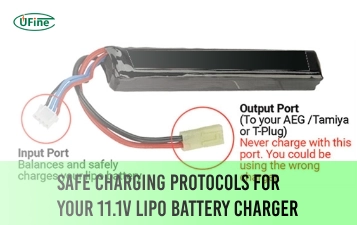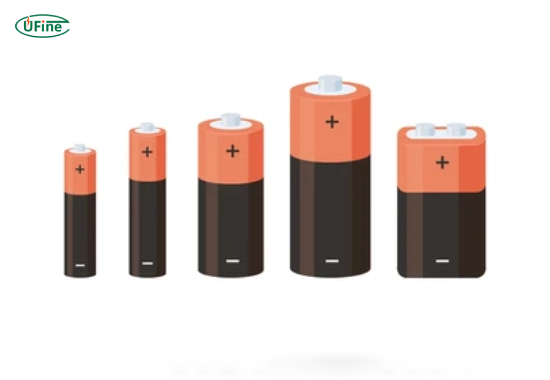When your remote control dies or your flashlight dims, chances are you need a 1.5V battery. As the global standard for household electronics, these power sources fuel 78% of portable devices (Consumer Technology Association, 2023). This definitive guide cracks open the science behind 1.5V batteries, compares alkaline vs. lithium vs. zinc-carbon, and reveals pro tips to double battery lifespan.
Part 1. What is a 1.5V battery?
A 1.5V battery is an electrochemical cell with a nominal voltage of 1.5 volts. Many people use it in various electronic devices due to its reliability and efficiency. The voltage rating indicates the potential difference between the battery’s positive and negative terminals, which is crucial for powering devices.
Key Characteristics:
- Voltage: The standard output voltage is 1.5 volts.
- Chemistry: Common chemistries include alkaline, zinc-carbon, and lithium.
- Size: Available in various sizes such as AA, AAA, C, D, and 9V.
- Rechargeability: Some types are rechargeable (like lithium-ion), while others are single-use (like alkaline).
1.5V Battery Type Comparison
| Type | Energy Density | Cost per Unit | Best For | Lifespan* |
|---|---|---|---|---|
| Alkaline | 2900 mAh | $0.50 | Remote controls | 5-7 years |
| Lithium | 3500 mAh | $1.20 | Digital cameras | 10-15 years |
| Zinc-Carbon | 1200 mAh | $0.30 | Wall clocks | 2-3 years |
* Shelf life at 21°C. Source: IEEE Battery Report 2023
Types of 1.5V batteries
Understanding the different types of 1.5V batteries can help you choose the right one for your needs.
Alkaline Batteries
Alkaline batteries are among the most popular types of 1.5V batteries. They are known for their long shelf life and high energy density.
Advantages:
- Long-lasting
- Wide availability
- Cost-effective
Disadvantages:
- Non-rechargeable
- Environmental concerns due to disposal
Zinc-Carbon Batteries
Zinc-carbon batteries are another common type of 1.5V battery, primarily used in low-drain devices.
Advantages:
- Economical
- Suitable for low-drain applications
Disadvantages:
- Shorter lifespan compared to alkaline
- Less stable under high-drain conditions
Lithium Batteries
Lithium batteries offer superior performance and longer life than alkaline and zinc-carbon options.
Advantages:
- Lightweight
- High energy density
- Excellent temperature performance
Disadvantages:
- Higher cost
- Limited availability in specific sizes
Part 2. How do 1.5V batteries work?
A 1.5V battery operates based on electrochemical reactions within the battery cells. When the battery is connected to an electronic device, a chemical reaction occurs between the anode (negative terminal) and cathode (positive terminal), generating electrical energy.
What are the components of a 1.5V battery?
- Anode: Typically made from zinc in alkaline batteries, the anode undergoes oxidation during discharge.
- Cathode: Commonly composed of manganese dioxide or lithium compounds, the cathode undergoes reduction.
- Electrolyte: This substance facilitates ion movement between the anode and cathode, allowing the chemical reaction to generate electricity.
Part 3. What are the applications of 1.5V batteries?
The versatility of 1.5V batteries allows them to be used in a wide range of devices:
- Remote Controls: Most remote controls for televisions and other appliances use AA or AAA alkaline batteries.
- Toys: Many battery-operated toys rely on 1.5V batteries for power.
- Flashlights: Portable flashlights often utilize 1.5V batteries for illumination.
- Smoke Detectors: Most smoke detectors require 1.5V batteries to ensure reliable operation.
Part 4. What are the advantages and disadvantages of using 1.5V batteries?
Using 1.5V batteries comes with several advantages:
- Availability: They are widely available in stores and online, making them easy to replace.
- Affordability: Generally, they are inexpensive compared to other battery types.
- Versatility: They can power a variety of devices across different categories.
Using 1.5V batteries comes with several disadvantages:
- Environmental Impact: Many types are non-rechargeable and contribute to waste.
- Performance Limitations: Some may not perform well under high-drain conditions.
- Limited Lifespan: Non-rechargeable versions have a finite lifespan.
Part 5. How long do 1.5V batteries last?
The lifespan of a 1.5v battery depends on chemistry and usage:
Direct Answer: A standard alkaline AA battery lasts 300-900 hours in low-drain devices. In high-drain devices like digital cameras, lifespan drops to 1-3 hours continuous use.
Real-World Usage Data:
- 📊 TV remote (alkaline): 12-18 months
- 📊 Wireless mouse (lithium): 8-12 months
- 📊 LED flashlight (zinc-carbon): 15-20 hours
Part 6. How should you store 1.5V batteries?
Proper storage can significantly extend the life of your 1.5V batteries:
- Please keep them in a cool, dry place, away from direct sunlight.
- Store them in their original packaging until use to prevent accidental short-circuiting.
Avoid storing them near metal objects that could cause contact with terminals.
Part 7. How to choose the best 1.5V battery: 2025 Buyer’s guide
Industry Expert Tip: “Match drain rate to device. High-drain gadgets like gaming controllers need lithium, while alkaline suffices for smoke detectors.” – Dr. Elena Rodriguez, Battery Research Institute
Decision Checklist:
- ✅ Low-drain devices (clocks/remotes): Use alkaline to save cost
- ✅ High-drain devices (cameras/gamepads): Lithium extends runtime 3X
- ✅ Extreme temperatures: Lithium operates at -40°C to 60°C
Part 8. Are there eco-friendly options for 1.5V batteries?
Yes! There are eco-friendly alternatives available:
- Rechargeable Batteries: You can reduce waste by reusing NiMH and lithium-ion options multiple times.
- Eco-Friendly Alkaline Batteries: Some manufacturers produce alkaline batteries that use less harmful materials and offer recycling programs.
Why is recycling important?
Recycling helps prevent hazardous materials from entering landfills and promotes sustainable practices by recovering valuable metals.
Part 9. Can you recharge 1.5V alkaline batteries?
While most alkaline batteries are designed for single use, some brands offer rechargeable alkaline options:
- You can recharge these rechargeable alkaline batteries several times. Still, they generally have lower capacity than NiMH or lithium rechargeable options.
What about other types?
Due to their design and chemistry, rechargeable NiMH and lithium-ion batteries are better suited for repeated charging.
Part 10. What safety precautions should you take with 1.5V batteries?
When using or disposing of 1.5V batteries, consider these safety tips:
- Avoid mixing different types or brands of batteries in one device, as this can lead to leakage or explosion.
- Do not expose batteries to extreme temperatures or moisture, which can cause damage or leakage.
- Dispose of used batteries properly at designated recycling centers or programs.
Part 11. FAQs about 1.5V batteries
Are all 1.5V batteries the same size?
No! Common sizes include:
- AA (14.5mm diameter x 50.5mm height)
- AAA (10.5mm x 44.5mm)
- C (26.2mm x 50mm)
- D (34.2mm x 61.5mm)
Always check device requirements.
What is the difference between AA and AAA 1.5V batteries?
AA and AAA refer to the battery’s physical size; AA is larger than AAA, but both provide the same voltage output of 1.5 volts.
Can I use a rechargeable battery instead of a regular one?
Yes, but ensure that your device is compatible with rechargeable types, as they typically have slightly lower voltage when fully charged (around 1.2 volts).
How do I know if my battery is dead?
If your device stops working suddenly or shows signs like dimming lights or slow operation, your battery may be dead or need replacement.
Can I mix different brands of batteries in my device?
It’s not recommended, as different brands may have varying voltages and chemistries, which could lead to leakage or reduced performance.
How should I dispose of old batteries?
Take used batteries to local recycling centers or community collection events that handle hazardous waste properly
Related Tags:
More Articles

Safe Charging Protocols for Your 11.1V LiPo Battery Charger
Safely charge your 11.1V LiPo battery by following proper rates, using safety tools, and avoiding common charging mistakes.
11.1 V LiPo Battery Airsoft: Boosting Field Performance
Upgrade your airsoft gun with an 11.1V LiPo battery for faster firing, longer runtime, and top-tier performance on the battlefield.
Batteries for Trolling Motors Lightweight vs. Leaf Blower Power
Explore the best lightweight trolling motor batteries and how they compare to leaf blower power for performance, portability, and runtime.
What Is a 2C Battery?
Learn what a 2C battery is, how C-rates affect performance, and how to calculate the number of batteries your device needs.
What Battery Does LED Strips Use?
Discover which batteries power LED strips best. Learn about voltage, capacity, battery types, and how to safely power your LED lighting projects.





